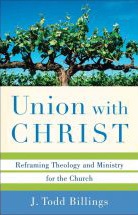Das Ende des christlichen Lebens
 Billings hat an der Harvard University Divinity School (USA) im Fach Theologie promoviert. Er ist sowohl Professor für Reformierte Theologie am Western Theological Seminary (USA) als auch Krebspatient im Endstadium. Sein Buch über die Gemeinschaft mit Christus ist sehr hilfreich. Nun hat er ein Buch über das Sterben geschrieben. In einer Besprechung schreibt Matt Boga:
Billings hat an der Harvard University Divinity School (USA) im Fach Theologie promoviert. Er ist sowohl Professor für Reformierte Theologie am Western Theological Seminary (USA) als auch Krebspatient im Endstadium. Sein Buch über die Gemeinschaft mit Christus ist sehr hilfreich. Nun hat er ein Buch über das Sterben geschrieben. In einer Besprechung schreibt Matt Boga:
Wo es früher die Norm war, dass man Friedhöfe am Weg zum Kircheneingang gelegen fand, ist das heutzutage leider kaum noch der Fall. Dadurch werden Gottesdienstbesucher, die zur Kirche kommen oder sie verlassen, nicht mehr automatisch damit konfrontiert, dass sie vor ihrem Schöpfer nur Staub sind. Stattdessen haben wir die Toten aus unseren Augen verbannt. Entgegen der Weisheit, die wir im Buch Prediger finden (vgl. Pred 7,2), haben wir entschieden, dass es unangenehm ist, den Tod immer vor Augen zu haben.
Den Tod zu verleugnen ist letztlich eine Vermeidungsstrategie, die„die Gesellschaft am Laufen hält“ (S. 80) – Christen sind hierbei maßgeblich beteiligt. Wir können nur wahrhaftig Mensch sein, wenn wir uns selbst „in Bezug zu dem Übernatürlichen setzen“ (S. 81). Leider neigen wir Menschen dazu, „unser Handeln als den Mittelpunkt der Weltgeschehnisse zu betrachten“ (S. 88–89) anstatt Gott selbst. Weil wir uns davor scheuen, unsere Sterblichkeit vollends zu akzeptieren, setzen wir unsere Hoffnung auf „Helden“ und ihre Versprechen – und schaffen uns Götzen (vgl. S. 89–92).
Mehr: www.evangelium21.net.
 Mein persönliches Buch des Jahres 2011 heißt:
Mein persönliches Buch des Jahres 2011 heißt: